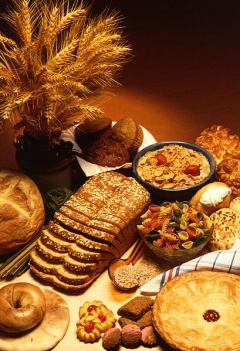Difference between revisions of "Farina"
| Line 1: | Line 1: | ||
{{Infobox_Miscellaneous | {{Infobox_Miscellaneous | ||
| − | | image = | + | | image = Farina.jpg |
| − | | origin = | + | | origin = - |
| − | | stowage factor = | + | | stowage factor = - |
| − | | humidity and moisture = | + | | humidity and moisture = - |
| − | | ventilation = | + | | ventilation = - |
| − | | risk factors = | + | | risk factors = - |
}} | }} | ||
==Description== | ==Description== | ||
| − | Farina is a cereal food, frequently described as mild-tasting, usually served warm, made from cereal grains. In contemporary English use, the word usually refers to semolina or Cream of [[Wheat]] made from soft wheat. Wheat farina is a carbohydrate-rich food, often cooked in boiling water and served warm for breakfast, or cooked with milk and made into semolina pudding. It is used as an ingredient in many dishes and in processed foods such as breakfast [[cereals]] and pasta. | + | Farina is a cereal food, frequently described as mild-tasting, usually served warm, made from cereal grains. In contemporary English use, the word usually refers to semolina or Cream of [[Wheat]] made from soft wheat. Wheat farina is a carbohydrate-rich food, often cooked in boiling water and served warm for breakfast, or cooked with milk and made into semolina pudding. It is used as an ingredient in many dishes and in processed foods such as breakfast [[cereals]] and pasta.<br><br> |
| − | <br><br> | + | The word farina comes from the Latin "farina" meaning meal or [[flour]].<br><br> |
| − | The word farina comes from the Latin "farina" meaning meal or [[flour]]. | + | Farina is made from the germ and endosperm of the [[grain]], which is milled to a fine granular consistency and then sifted. Because the [[bran]] and most of the germ are removed, this cereal is sometimes enriched with Vitamin B and iron. Farina, by itself, is most often served as a breakfast cereal, but can also be cooked like polenta.<br><br> |
| − | <br><br> | + | When enriched, it is one of the single best sources of dietary iron available, especially for vegetarian diets, with most brands offering as much as 50% of the recommended daily value in a single 120-calorie serving. Common additives to it for cereal are [[cinnamon]], [[butter]], sugar, or [[salt]]. These can help add to an otherwise bland taste.<br><br> |
| − | Farina is made from the germ and endosperm of the [[grain]], which is milled to a fine granular consistency and then sifted. Because the [[bran]] and most of the germ are removed, this cereal is sometimes enriched with Vitamin B and iron. Farina, by itself, is most often served as a breakfast cereal, but can also be cooked like polenta. | + | The produce is liable to damage by humidity moisture and odours.<br><br> |
| − | <br><br> | + | |
| − | When enriched, it is one of the single best sources of dietary iron available, especially for vegetarian diets, with most brands offering as much as 50% of the recommended daily value in a single 120-calorie serving. Common additives to it for cereal are [[cinnamon]], [[butter]], sugar, or [[salt]]. These can help add to an otherwise bland taste. | + | See also [[Cereals]] or [[Grain]] |
| − | <br><br> | + | |
| − | The produce is liable to damage by humidity moisture and odours. | + | |
| − | <br><br> | + | |
| − | + | [[Category:Products]] | |
[[Category:Food and beverages]] | [[Category:Food and beverages]] | ||
| − | |||
Latest revision as of 09:47, 22 April 2013
| Infobox on Farina | |
|---|---|
| Example of Farina |  |
| Facts | |
| Origin | - |
| Stowage factor (in m3/t) | - |
| Humidity / moisture | - |
| Ventilation | - |
| Risk factors | - |
Farina
Contents
Description
Farina is a cereal food, frequently described as mild-tasting, usually served warm, made from cereal grains. In contemporary English use, the word usually refers to semolina or Cream of Wheat made from soft wheat. Wheat farina is a carbohydrate-rich food, often cooked in boiling water and served warm for breakfast, or cooked with milk and made into semolina pudding. It is used as an ingredient in many dishes and in processed foods such as breakfast cereals and pasta.
The word farina comes from the Latin "farina" meaning meal or flour.
Farina is made from the germ and endosperm of the grain, which is milled to a fine granular consistency and then sifted. Because the bran and most of the germ are removed, this cereal is sometimes enriched with Vitamin B and iron. Farina, by itself, is most often served as a breakfast cereal, but can also be cooked like polenta.
When enriched, it is one of the single best sources of dietary iron available, especially for vegetarian diets, with most brands offering as much as 50% of the recommended daily value in a single 120-calorie serving. Common additives to it for cereal are cinnamon, butter, sugar, or salt. These can help add to an otherwise bland taste.
The produce is liable to damage by humidity moisture and odours.











